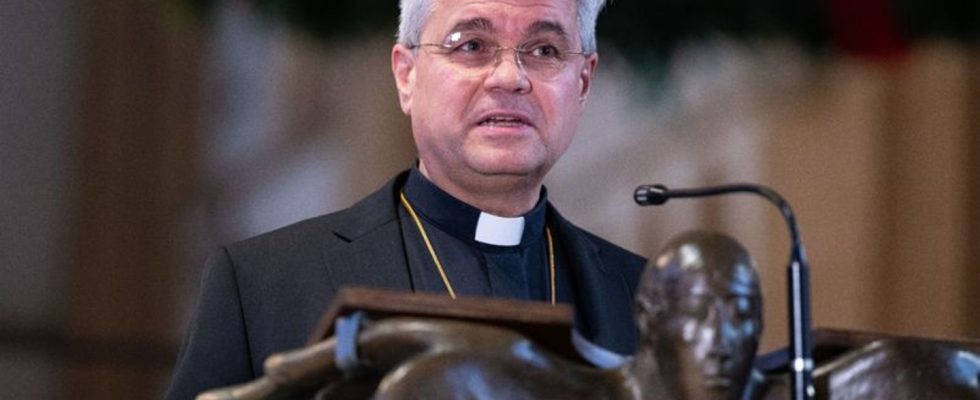Catholic Church
Pope appoints new archbishops of Paderborn and Bamberg
The new Archbishop of Paderborn, Udo Markus Bentz, speaks in Paderborn Cathedral. photo
© Guido Kirchner/dpa
The faithful in the Catholic archdioceses of Paderborn and Bamberg had to wait more than a year for their new archbishops. Pope Francis has now filled the important church positions.
The believers in Paderborn and Bamberg have been waiting for a new archbishop for more than a year. Your two previous chief shepherds took early retirement at the end of last year. Bentz is now starting over in the Westphalian Archdiocese of Paderborn, while Gössl, in turn, has been heading the Franconian Archdiocese of Bamberg on an interim basis as diocesan administrator for a year.
The appointment by Pope Francis was eagerly awaited in both archdioceses. “The time of waiting and prayer was worth it,” it was said in Paderborn. The two new archbishops now assume central leadership positions in the Catholic Church in Germany. Around 1.4 million Catholics live in the Archdiocese of Paderborn and around 600,000 in the Archdiocese of Bamberg. There are seven archdioceses nationwide.
Bishop Bätzing congratulates dignitaries
Bentz, who was previously auxiliary bishop and vicar general in Mainz, is considered to be rather liberal in terms of church politics. The chairman of the German Bishops’ Conference (DBK), Bishop Georg Bätzing, congratulated the future Archbishop of Paderborn. Bätzing emphasized that tradition and innovation as well as popular piety and synodality belong together in Paderborn. He thanked Bentz in particular for his commitment to the Catholic reform process “Synodal Way”.
Bentz himself had promised to talk to as many people as possible and to act together. “I really want to be a church together with you here in the Archdiocese of Paderborn with all the strength I have been given,” it said in the speech manuscript.
Bätzing also praised the previous commitment of the new Bamberg Archbishop Gössl. He sees Gössl’s appointment as a sign of continuity, it said in a statement. It can be felt that Gössl is someone who wants to shape the church of the future carefully and in practical steps. He has already shown leadership qualities in his previous positions. “Above all, it will be your philanthropic nature and profound spirituality that will characterize your future service.”
Gössl has also been involved in the “Synodal Path” in the past. “You were personally involved in the Synodal Way and expressed your theological convictions both in the forum work and in the synodal assemblies,” said Bätzing.
“We are church” calls for commitment to reform processes
In view of the appointments, the Catholic reform group “We are Church” demanded that the new archbishops very quickly and fully commit to the reform processes of the Synodal Way in Germany. “Otherwise, the Roman Catholic Church and the episcopate will continue to lose authority in view of the abuse and cover-up scandals that have still not really been dealt with,” it said in a statement. Church members should also be better involved in future appointments.
After the official appointment on Saturday, the dioceses of Osnabrück and Rottenburg-Stuttgart in Germany are now without a diocesan bishop. In addition, the situation in the Archdiocese of Cologne remains uncertain. The highly controversial Cardinal Rainer Maria Woelki offered the head of the Catholic Church his resignation a year and a half ago in connection with the investigation into cases of sexual abuse in Cologne. A decision from Pope Francis is still pending.

